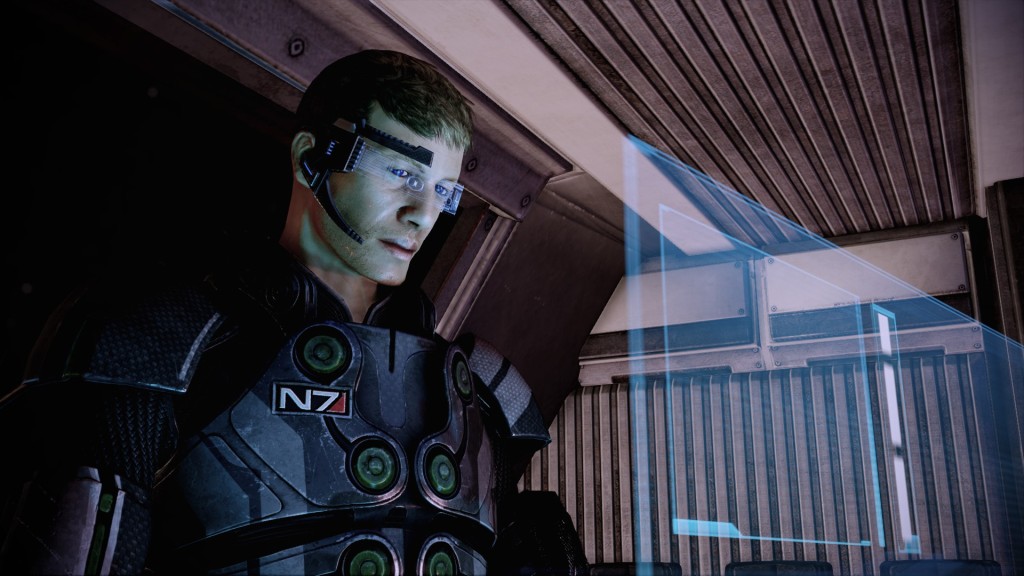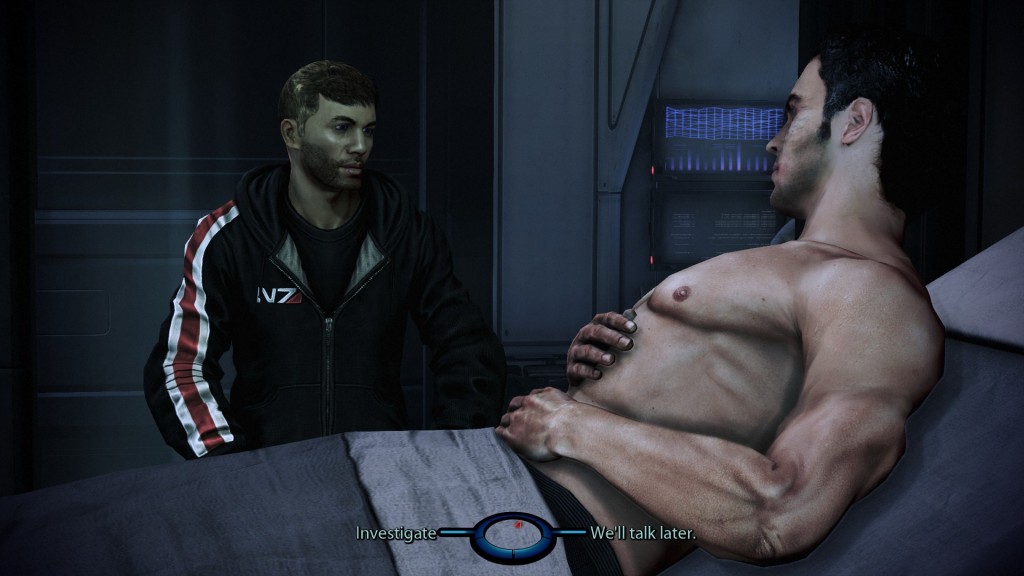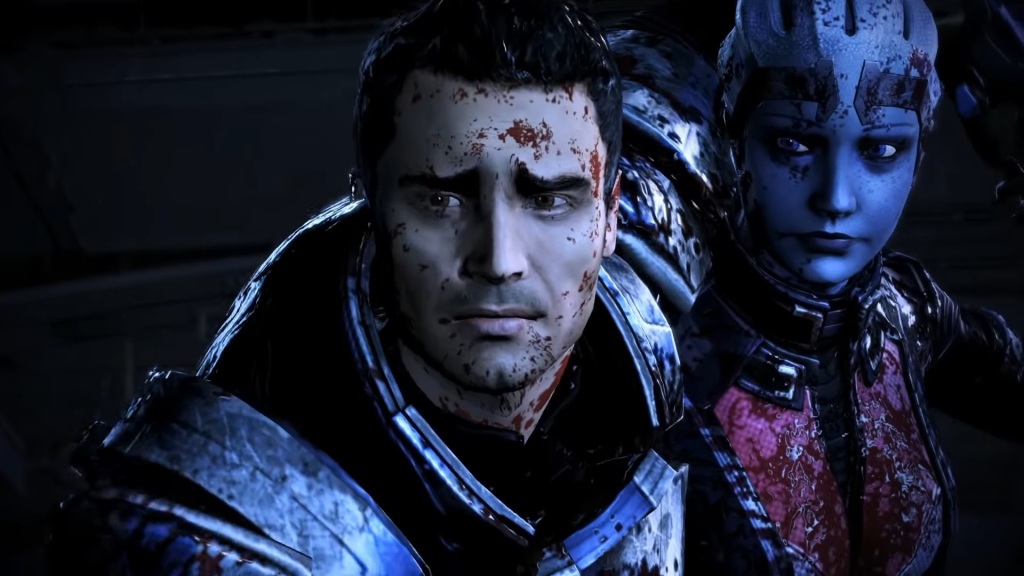
Several years ago I attempted to play through the Mass Effect series with my morally acrobatic but overall paragon Femshep. By the time I got to the third game I began to have this sinking feeling that something wasn’t right.
No, it wasn’t the fact that her lips were more than slightly and comically pronounced as if she got a heavy dose of some drag queen level fillers. The first game’s graphics wound up not portraying this fact very well, so it wasn’t until Mass Effect 2 that I began to see the cosmetic horror I had created. Still, I loved her. And she loved Kaidan. And then she loved Garrus. And then she started to love Kaidan again in Mass Effect 3.
And that is when the sinking feeling began.
You see, I didn’t expect to like Mass Effect so much. For years I saw it as an overly action-y diet RPG and I unconsciously resented it for depriving me of a KOTOR 3. In fact, the first couple of hours were very much a “been there, done that” experience considering that, mechanically, it felt very much like KOTOR, aside from the shooting stuff. Go to this planet. Use the force, er, um… the Mass Effect.
But then Virmire happened. And while this planet was the typical plot twist that Bioware has written time and again, this particular permutation is what elevated the series and its emphasis on choices and consequences. It was from Virmire on that I began to truly love the series. So why did I stop playing my Femshep story?
Romance. Bioware romance in particular. I’m a junky for it. Starting with Baldur’s Gate 2 and then continuing with KOTOR and the proto-Kaidan hunk that was Carth Onasi, and of course now with Mass Effect.
My weakness to this silly narrative device now causes me to base entire RPG experiences around who my lover will be. It’s ironic that I still gravitate to this as a gay adult with a husband, but it all began when I was an isolated not-out gay teenager who was desperate for examples of love that I was scared I would not ever find for myself.
Which means I’m no stranger to playing as women in RPG’s. In some ways it’s more compelling but for years it was also the only way I could hear another man tell me he loved me, even though it was all a fiction.
So playing Femshep was not a problem for me. Jennifer Hale’s voice acting didn’t hurt either. Playing Femshep gave me access to all of those juicy, juicy (okay, only a couple) love scenes and all that flirty dialogue.
But then Mass Effect 3 started to happen. And Mass Effect 3 also gives the player access, finally, to some same sex romances, besides Liara. So as my Femshep chatted away with Kaidan in the hospital, asking forgiveness for working with Cerberus and cheating on Kaidan with Garrus (poor Garrus, he turned out to be amazing!), I realized that I could have been romancing Kaidan *as a man*.
Emotional paralysis set in. Should I forge ahead with Femshep, or could I trudge through the romantic desert of the first two games with a Gayshep? Instead of deciding, I set the game aside and never looked back.
Well, that’s not true. I looked back quite a bit. Then, several years later, with the release of Mass Effect: Legendary Edition I finally had a chance to rectify this.
At first I was daunted by the fear of missing out. I mean, nothing was stopping me from sleeping with whoever I wanted, right? Wouldn’t Kaidan still love me anyway?
Saving Kaidan in Mass Effect 1 basically locked Shepard into being a gold star gay anyway, at least for that game. So, I had to imagine the sexual tension between Kaidan and Shepard because Kaidan barely talked to me anyway. Seriously though, even for Femshep Kaidan is a decent if overlooked lover in the first game but I have some suspicions that the developers never expected Femshep to become as iconic as she did. It’s just a straight boys’ world and everyone else is just living in it, am I right? (Sarcasm)

The long, sexless, loveless slog continued through Mass Effect 2, but it wasn’t nearly as bad as I expected. Of course, Mass Effect 2 on its own is amazing, as far a characters and story go, so it wasn’t a hardship. In fact, it started to make sense. Sure, there were still advances from women, unconsented ones I might add, and I did wind up having to tell Miranda that we’d just be friends.
In fact, interacting with squad mates felt just like being gay and not 100% out would. You avoid women who might have a thing for you because you don’t want it to get awkward. You feel occasionally feel awkward buddying up to other guys because, well, it will never go the way you would ideally want so, again, awkward.
Not time for love. Just duty I guess. That’s what made sense.
In many ways, the character of Shepard is a composite of many western action heroes from all sorts of media like novels, television, film, comics, etc. And for characters in those mediums, it is always the mission that comes first. James Bond, for example, famously has flings with countless women, but they are all momentary dalliances. Just physical fun until the right opportunity to drive the mission home presented itself, with only a couple of exceptions.
And like James Bond, the straight player has several opportunities to appease Shepard’s physical needs, even if some of those turn out to be more serious. But they don’t have to. Choose a new partner each game if you want. Be just like James Bond, but in space. Don’t let anyone too close, and just use them for sex or something.

And let’s be real, if Gayshep has just as many opportunities to sleep around don’t think players wouldn’t.
But it’s getting to Mass Effect 3 where things began to change. I knew I could finally have my chance, so after every mission I found myself compulsively checking personal messages, showing up at the hospital where Kaidan was recovering, and eventually rejoining with him.
I couldn’t help it. I’d spent two games not just denying my desires, but having the games deny me any way to express them.

And then once things started for real with Kaidan, it was better than ever. We had put Cerberus behind us, he complimented me, he told me that we could be there for each other as the galaxy fell apart. Sign me up. He even cooked allegedly Canadian cuisine which is apparently alliterative as well.
The game changed. Literally. In the game I had someone to live for, to fight for, and it wasn’t just work any more. It was personal. It was intimate. It was no longer about the mission, about duty, and when it was about those things my squad mate and partner Kaidan would be there to share the burden so that we could both, hopefully, see it to the end.
Until the end, that is.
I knew that the ending was… controversial. I had avoided spoilers for the better part of a decade as to why, specifically, the ending was controversial, but I had my suspicions. Epic games like this lend themselves to high stakes and high costs. It’s not mystery what that could mean.
So when Shepard called in for an emergency evac to extract Kaidan and Liara (my main squad when ever I could get them), I knew this would be tough. I had been dreading this moment. I didn’t want it to happen. I considered stopping the game right then and there for a moment. Yes, they did share their “I love yous”, yes it was a tender moment despite the terrific and frightful battlefield.

But then… ugh. Kaidan’s face as Shepard went off to do the heroic thing. His face said it all. And it broke me. I mean really, congrats to the animators on this one. Kaidan’s eyebrows deserve an award. It was perfect and terrible all at once. And that was actually the end of the game for me.
Yes, I did beat the rest, but it didn’t matter as much.
My senior English teacher said that true death is when the ego ceases to exist, the sense of “I am”. When one no longer has that sense, they are dead, even if their body still lives.
And at that moment in Mass Effect 3, me as the person playing Shepard had no more ego. Everything that had brought my Shepard to life was back on the Normandy. The mission had ceased being the driving force because Shepard had found something more personal, more fulfilling.
And yes, it was romance, Bioware’s cheap, drug-like, melodramatic love . But it was also validation, and acceptance, and representation and everything that I hadn’t realized I had been doing without in a video game, because you know what? LGBT people don’t get those things thrown at us as often in real life either.
Mine and my Shepard’s ego in the world of Mass Effect had become a fully realized gay person. He wasn’t just a soldier anymore. He was fully human. He loved and could give love. Isn’t that why it was worth fighting the Reapers?
And he had to give it up.
I played through the last several minutes in a heartbroken, dissociative haze. It didn’t feel real. It didn’t feel important. Perhaps that what it would have taken if the game were real, such depersonalization in order to act in circumstances that are literally larger than life. But it wasn’t about Kaidan, so I didn’t really care anymore.
Okay maybe a little, but it didn’t matter nearly as much as the sorrowful man on the Normandy adding my Shepard’s name plate to the rest of the crew’s fallen. What about Kaidan, now? Should I even ask?
I don’t regret anything, though. It’s still a great series. Besides, there is always another run but with Steve Cortez, instead. Maybe I can do a bit of Project Lazarus myself and get Femshep going again. But I think this first complete run to the end with Kaidan will always stick out. He was there at the beginning, and almost there until the end. If only I could stop thinking about those mournful eyebrows…







